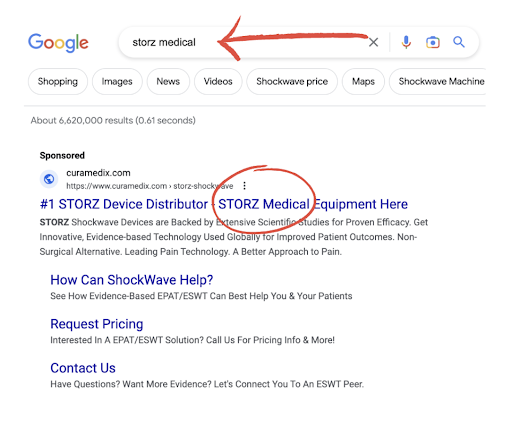When looking at your marketing budget, you may be wondering, “how much money should I be spending on my B2B Google Ads?” You’re definitely not alone in asking this question – in fact, as an agency that specializes in paid search and social media, we can safely say that we get asked this question many times a month.
And while we wish we had a straightforward answer, the truth is this: it depends. Why? Well, choosing the right Google Ad spend depends on a lot of different factors.
Since it’s not a one-size fits all solution, in this article, we’re sharing our honed perspective on creating effective B2B Google Ads that have the right spend behind them. So, skip the Google search and start reading!

How is the Cost of a B2B Google Ad Determined?
When launching a B2B Google Ad, your overall spend will be determined based on the competitiveness of your keywords and potential keyword search volume. From there, your ad cost will range based on a number of factors, including:
- Ad Rank: Using an algorithm called “Ad Rank”, Google determines the position of your ad within its search engine. This platform ranks your ad based on bid, quality, expected click rate, landing page links, and more.
- Maximum Bid: When setting up a Google Ad campaign, you will need to specify the maximum amount of money you're willing to pay for each click to your ad (a.k.a. Your maximum bid).
- Quality: The quality of your ad is measured by giving it a “Quality Score.” This score is determined based on the relevance of your ad, keywords used, and the landing page effectiveness associated with the ad. The higher the quality of your ad, the better your eventual cost per click will be.
- Cost Per Click: The eventual cost you pay per click (CPC) is influenced by the Ad Rank of the ad below yours divided by your Quality Score, plus a small incremental cost (consider that tax). You’re paying just enough to maintain your position without overpaying unnecessarily. However, we’ll note that CPC is almost impossible to predict upfront. As noted above, it’s based on a lot of different factors and will want to be monitored closely over time.
See? Not quite as straightforward an answer as you were hoping for. But the good news is that all of these factors are controllable based on the type of ad you develop, who you plan to serve it to, and what your end goal is – we’ll get into that shortly. Now that we’ve covered the basics, let’s have a more detailed conversation about investing in B2B Google Ads.
Why B2B Google Ads Are an Investment vs. a Cost
Along with getting asked how much to spend on B2B Google Ads, we also commonly are asked about why paid search should be prioritized in a marketing budget. There are numerous reasons why you should invest time and resources in building out your Google Ad campaign strategy, but before you do so, it’s important to shift your mindset on how you think about Google Ads.Of course, you’ll still want your ad spend to be a figure that you feel comfortable spending – but rather than looking at it as a one-off cost, we recommend thinking of B2B Google Ads as an ongoing investment in a tool that bolsters your marketing strategy, amplifies your message, and if done right, will develop a verifiable ROI. Once you start to think about Google Ads as a tactic that must be invested in and iterated on, you’ll start to reap the benefits of this powerful tool.Which leads us to…
4 Benefits of Investing Budget in B2B Google Ads
There are many reasons why you would invest your precious marketing dollars in developing a Google Ad campaign. Off the top of our heads, B2B Google Ads are a great investment because they have:
1. ROI and Measurability
Google Ads allows your business to reach a massive online audience through well-planned and optimized ads. Unlike some advertising mediums, Google Ads target commercial intent searchers willing to spend money to find a solution that fits their needs/problem. From there, the platform is able to quantify an ROI.The service itself offers robust measurement capabilities that enable you to iterate on your ads over time and attract more qualified leads. From impressions to clicks, conversions, and other key metrics, Google provides a highly reliable, data driven solution to measuring your ad spend and justifying your campaign needs. We will note that sometimes it takes time to get the right mix with your Google Ads, so don’t give up if you don’t see the results you want right away. Launch, measure, iterate – wash, rinse, repeat.

2. Ongoing Brand Awareness
While a television or radio commercial gives you just one chance to connect with the end user and sell to them, Google Ads ensure that your brand is consistently served to potential customers during their online journey. By embedding it into the makeup of search engine result pages, Google is able to serve as a brand awareness tool for your company, and increase the likelihood of conversion over time.
3. Flexibility and Scalability Based on Your Budget and Needs
Contrary to traditional advertising, Google Ads is highly flexible and scalable based on your budget and how much time you want/need to advertise your product or service. After launching your campaign, be sure to pay close attention to the performance of your ads over time. If starting with a smaller budget, you can measure effectiveness of your campaign at that price point and then adjust budget and content over time to fit your needs. Fine-tuning your strategy keeps your investment fresh and makes for a higher likelihood of getting the results you want for your business.
4. Highly Customizable Targeting Capabilities
Google Ads have immense targeting capabilities that help businesses obtain bottom of the funnel commercial intent searchers. The platform does so by refining the audience and ensuring their ads are being shown to the most relevant end users. A few of the key targeting capabilities you have access to on the Google backend include:
- Keywords: When it comes to keywords, you’re able to choose specific words or short phrases that have high relevance to your product or service. By inputting these keywords, you may be served up to users who search for that specific keyword or search string. However, picking keywords can be tricky because you don’t want to pick ones that are too broad or too highly competitive. Food for thought as you build out your keyword strategy!
- Geotargeting (location): If you want your B2B Google Ads to only show up in a certain geographical area, consider using the location targeting function to refine your ads to a specific country, region, city, or even small radius around a particular location.
- Languages: This one is pretty straightforward – Google Ads allow you to target users who speak specific languages, ensuring that whomever is seeing your ads can understand them.
- Demographics: From age to gender, income, parental status, and more, Google Ads can be highly customized to fit a demographic group that would be interested in your product or service.
- Interests: Google is able to index end users’ interests and online behaviors in order to customize its targeting capabilities to fit your business needs. For example, it may profile a person who consistently searches for new sneaker brands and serves up ads to them that fit within this category.
Step-by-Step Guide: Launching an Effective B2B Google Ads Campaign
Step 1. Ensure You Have the Right People at the Table
When you kickoff conversations about your paid search strategy, having the right team members take part in the conversation will make a huge difference. Ask yourself two key questions:
1) Do I understand how to target my audiences effectively?2) Do I know how to create a Google Ad campaign that has the potential to bolster my business goals
If the answer to these questions is “no”, don’t worry – the great news is that if you don’t have access to these resources in-house, you can always partner with an agency – like Precision Marketing Group – that knows paid search inside and out. In these initial conversations you can define your goals, investment comfort levels, keyword targets, audiences, and so much more. By having experts in these conversations from the get go, you’ll ensure that your Google Ad spend is thoughtfully executed with the right mix of content, targeting, and spend in the mix.
Step 2. Decide How Much You’re Able to Allocate to B2B Google Ads
Now, back to the coveted question and answer that you came to this blog for in the first place. As we mentioned before – and hopefully it makes more sense now that you’re this far into the blog – this is not a straightforward answer for a number of reasons. Mostly, it’s important to consider all of the factors of a strong Google Ad campaign before you dive right into numbers.As a rule of thumb, we recommend starting with: 1) a number you’re comfortable with, and 2) a number that isn’t so small that it won’t move the needle for your campaign – this would look like a minimum spend of $2,000 to $5,000 to start.
To help paint the picture, we’ll give a more tangible example: Let’s say that you’re a software (SaaS) startup in a big city. You have a $3,000 budget to dedicate to B2B Google Ads each month, but you have highly competitive keywords to go after and a lot of local competitors who offer similar services. Because of this mix of information, it’s important to refine your content so it’s customized to your exact audience so that you’ll get the greatest ROI for your spend. You’ll also want to consider if it’s worth going after the most popular keywords, or if your ads should cater to smaller search volume keywords that may lead to a greater ROI. In short, it’s a puzzle that you’ll have to play with to find the right mix, but can definitely be worth the time, effort, and investment if done correctly.
Step 3. Do a Competitor Analysis
Instead of shooting in the dark and hoping whatever you do sticks, consider looking at how your competitors are performing and what their strategy is before you launch. By doing so, you could uncover some helpful information including:
- Strategy insights and learnings: From choice of keywords to ad copy, learn from your competitors to see what’s working (and what’s not).
- Potential keyword opportunities: Are they using similar keywords to what you already uncovered? Or are they going after a keyword that might be relevant to your business that you haven’t thought of yet? Either way, these insights are helpful to curate content that’s highly relevant to your audience.
- How to differentiate yourself: While you’ll certainly be learning a lot about what your competitors are currently doing, you’ll also be able to figure out what you’re going to do differently in order to stand out and stay relevant with your audience.
Step 4. Shore Up Your B2B Google Ad Content
Now that you have all of the insights you need to launch a strong campaign, it’s time to build ad copy that reflects your company’s business goals. In order to create the best possible Google Ads for your business, you’ll want to craft compelling and persuasive messages that effectively communicate your value proposition and entice users to take action. When writing your ads, consider the following tips:
- Always keep your audience in mind
- Keep it simple and concise
- Use an eye-catching headline
- Highlight benefits (‘why’ the searcher will benefit, not just the ‘what’ of what your product is or does)
- Use testimonials to demonstrate authority and credibility
- Create a strong and useful call to action
- If it doesn’t work the first time, adjust it
Need some inspiration to get the creative writing juices flowing? Check out these 12 eye-catching Google Ads that translated to conversions.
Step 5. Launch, Measure, and Adjust
If we haven’t said it enough in this article, we’ll say it one more time: you’re not done with your Google Ads campaign once you launch – you have to measure your success. A strong B2B Google Ads strategy requires iteration and adjustments over time. But think of this as a win! As compared to other forms of traditional advertising (print, commercials, etc.), paid search allows you to measure thoughtfully and adjust to make results even better, so take advantage of the opportunity to do so.
What Makes for a Strong B2B Google Ad Campaign?
Curious what a strong B2B Google Ad campaign looks like in action? Our client, CuraMedix, came to us stumped about how to effectively reach their audience with B2B Google Ads. As the top distributor of German-made medical devices, and a preferred distributor for a brand called “STORZ Medical”, CuraMedix had lofty goals they needed to hit – so they partnered with Precision Marketing Group to help make it happen.After doing a deep dive into the data behind their current Google Ad strategy, PMG built out a thorough keyword, messaging, and landing page strategy that catered to CuraMedix’s unique goals. The results? 158 new leads, 12 new customers, and $1.2 million in revenue.

What to Avoid When Launching B2B Google Ads
As we’ve established, not all Google Ads are on the same playing field. To ensure your ads are the best they can possibly be, we wanted to provide you with a few quick tips for what to avoid in your ad development process.
One-Upmanship
Proving that you’re the uniquely superior choice over your competitor can be a challenging game. Try to avoid one-upping your competitors in your ad campaign, and instead focus on what you do really well. We can promise that, by highlighting the benefits your business provides, your ad copy will outperform any negative language you put forth.
Being Everything to Everyone
Think about dating - you can’t like or be liked by everyone you go on a date with. The same goes for your Google Ads copy. Instead of trying to appeal to the masses, focus on your specific audiences and create ad messaging that speaks directly to them. In turn, your cost-per-click will be better and your leads will be stronger. Win win.
Lacking of Strong Call to Action (CTA)
The key to a strong B2B Google Ads campaign is undoubtedly what you ask your audience to do at the end of the ad (your CTA). Instead of simply saying “find out more” or “learn about us”, consider giving a more direct CTA that provides direct feedback on the action you want them to take. For example, “Reach Out to Our Team” or “Learn about Our Pricing Packages.” By being more specific, you’ll be able to better define the next step you want your audience to take.
Are You Ready to Launch a Thoughtful and Effective B2B Google Ad Campaign?
Investing the right amount of money in your B2B Google Ads strategy can make a huge difference for your business. Capitalize on keyword opportunities and reach your audiences by partnering with an agency who understands paid search inside and out.
Want to connect with an expert about a paid strategy? Get in touch anytime – we’re happy to help.



